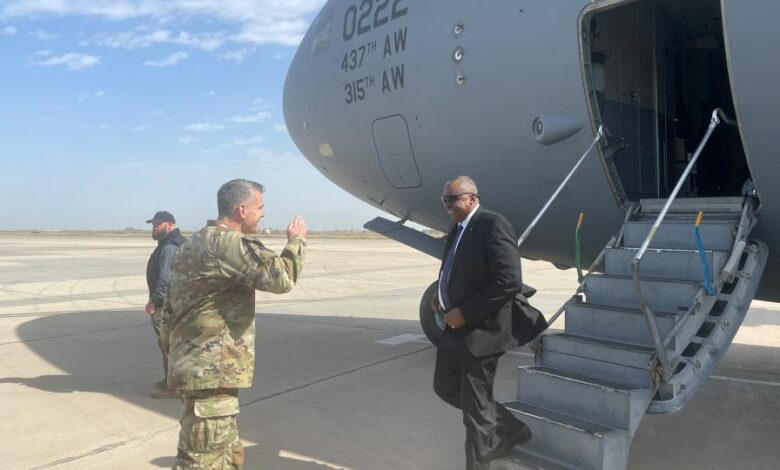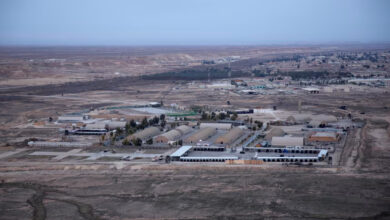
US Secretary of Defense Lloyd Austin said US troops are “ready to remain in Iraq” in his remarks during an unannounced trip to Baghdad on Tuesday, according to the US press pool traveling with him.
Austin, the highest-ranking Cabinet official to visit the country since the start of the Biden administration, according to the press pool, said in a statement that he is in Iraq to “reaffirm the US-Iraq strategic partnership as we move toward a more secure, stable and sovereign Iraq.”
The visit comes days before the 20th anniversary of the US invasion of Iraq that ousted dictator Saddam Hussein from power.
“Now looking forward, US forces are ready to remain in Iraq at the invitation of the Government of Iraq,” Austin said. “And these forces are operating in a non combat, advise assist and enable role to support the Iraqi led fight against terrorism. This is a critical mission. And we’re proud to support our Iraqi partners.”
Iraq is an important partner in the ongoing campaign to defeat ISIS. But unlike Syria, where US forces operated alongside Syrian Democratic Forces and other partners, the US military serves in an advise-and-assist role in Iraq, having officially ended the combat mission in Iraq in 2021.
He added, “The United States will continue to strengthen and broaden our partnerships in support of Iraqi security, stability and sovereignty.”
Austin met with Iraqi Prime Minister Mohammed Shia al-Sudani and is expected to meet other senior officials while he is in the country. The meeting with the Iraqi prime minister was not on camera, according to the pool traveling with the secretary.
Al-Sudani, whose formation of a government ended months of political deadlock and sometimes violent protests, welcomed Austin’s visit and signaled ongoing cooperation with the United States.
Iraq is keen to “strengthen and consolidate relations” with the US, al-Sudani told Austin during their meeting, according to the prime minister’s office.
Iraq plays a crucial role for the United States in containing Iran’s influence in the region. Iran has tried to exert control over Iraq through the use of proxy forces and Tehran’s sway with Shia political parties in Baghdad.
Before al-Sudani’s recent rise to power, Shia Muslim cleric Muqtada al-Sadr appeared poised to lead the government following the last elections. Al-Sadr had positioned himself against both Iran and the United States. But al-Sadr failed to form a government because of opposition from rival parties, ultimately opening the door to al-Sudani, who has so far shown a willingness to expand Baghdad’s relations with Washington.
After his visit to Baghdad, Austin went to Erbil, Iraq’s northern Kurdish regional capital, and met with the President of the Kurdistan Region and the Commander in Chief of the Region’s Armed Forces, Nechirvan Barzani.
In a joint press conference, Austin and Barzani stressed the importance of US support for Iraq and the Kurdistan region, with Barzani saying “mutual interests and principles” bring the two closer together.
Austin highlighted the cooperation on counterterrorism between the US and the Kurdish Peshmerga in confronting ISIS.
“Through the Global Coalition to Defeat Daash (ISIS), we liberated more than 50,000 square kilometers from Daash (ISIS) and we freed more than 4.5 million Iraqis from their cruel grip,” Austin said at the press conference.
This story has been updated with additional details.




